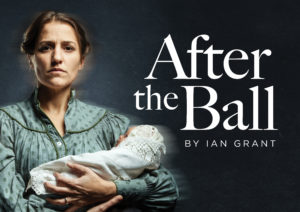Produced by Time Productions
Love and betrayal during the First World War resound down the generations. Blanche marries William in 1914, William enlists in the Army, goes off to war and but remains overseas longer than expected. On his eventual return, Blanche discovers letters that confirm her suspicions. Family life goes on but the gulf between them is bridged only by their different loves for their daughter, Joyce, born while he was away. The fissures in family life are as explosive as the blitz – does Joyce avoid a new/old betrayal? The action moves forward and back in time, between 1914 and 1973.
**** ‘‘With a script so well crafted, the development of the characters is refined’
‘Nadia Papachronopoulou’s production….stands out for its fresh and human take on a family’s drama without aiming to draw tears but rather to explore the social dynamics involved’.
The Upcoming **** ‘‘With a script so well crafted, the development of the characters is refined’
‘Nadia Papachronopoulou’s production….stands out for its fresh and human take on a family’s drama without aiming to draw tears but rather to explore the social dynamics involved’.
The Spy in the Stalls ***
‘intriguing to see actors constantly transition as the story moves backwards and forwards in time’
Stage-talk.com ***
‘showcases a terrific ensemble cast’
View from the Cheap Seat
‘Seeing William and Blanche as the same people, in the same clothes, whether hopeful fiancés in 1914 or ageing into impotent unhappiness fifty years on, reminds us that times may change, but we are who we have always been. It’s a triumphant thought, and a tragic one’
Upper Circle ***
‘a fresh take on the war genre; mixing tradition with modern interpretation. This concept is reflected … through complex female characters (a rarity in most war dramas), and a set design that merges the abstract with the traditional’
‘….[the] endearing relationship of mother Blanche and daughter Joyce. Two women who can be achingly similar in one moment and starkly contrasting in the next. The final scenes are powerful and staged perfectly by Nadia Papachronopoulou. As it returns full circle, the cycle begins again – every action has a consequence’
After the Ball is available as a published text from Cornwall Editions Ltd

Julia Watson and Stuart Fox

Julia Watson, Jack Bennett, Elizabeth Healey, Emily Tucker

Jack Bennet, Mark Carlisle

Emily Tucker


